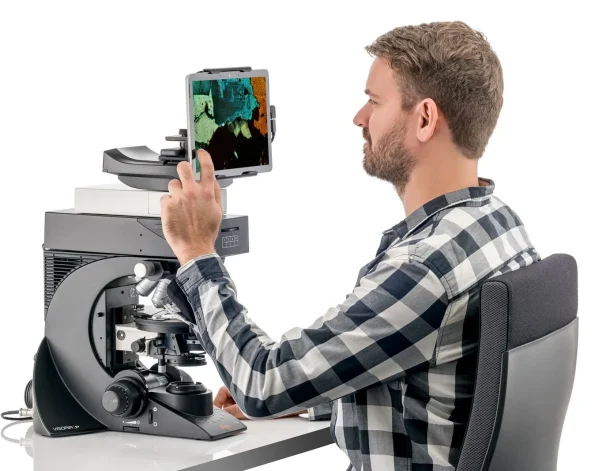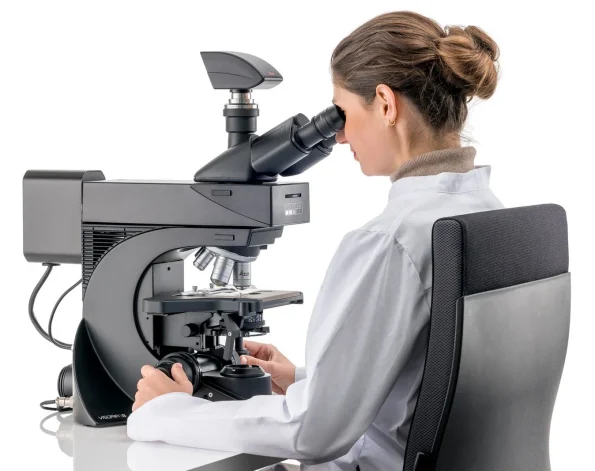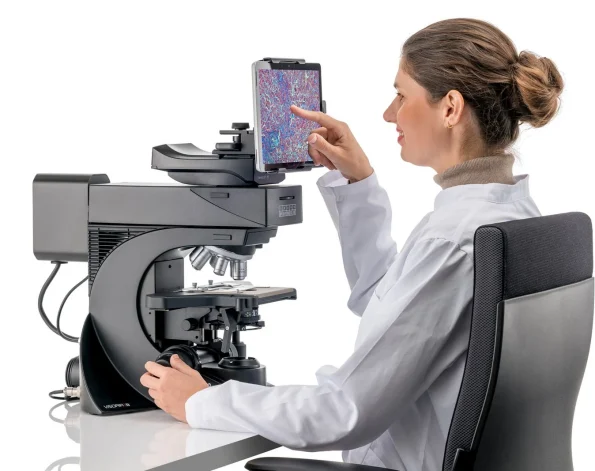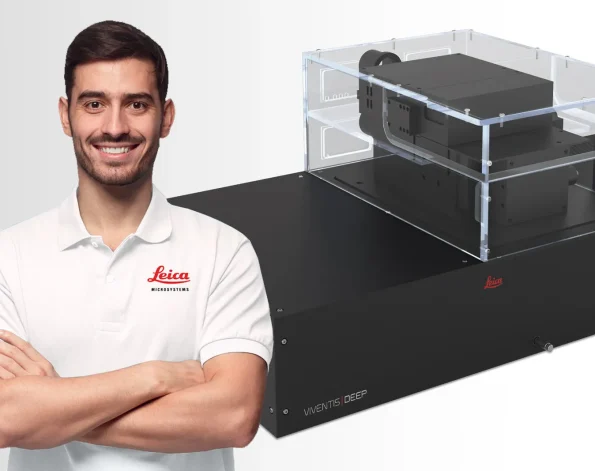ibidi : ECIS Model Z Theta
ไบโอเซนเซอร์ทางสัณฐานวิทยา ที่ใช้ในการวัดพฤติกรรมของเซลล์ซึ่งใช้วิธีการ employs a label-free และ non-invasive method เพื่อตรวจสอบเซลล์ที่ปลูกในเนื้อเยื่อด้วยระบบอิเล็กทรอนิกส์
- การทดสอบตามเซลล์แบบ Non-invasive ในตัวกลางเพาะเลี้ยง
- การวัดการเปลี่ยนแปลงรูปร่างของเซลล์
- การวัดหลายค่าแบบเรียลไทม์
- ระบบประกอบด้วย: ตัวควบคุมสถานี ECIS Model Z Theta, Elevated Field Module (เช่น ระบบพัลส์สำหรับการรักษาบาดแผลอัตโนมัติหรือการศึกษาทางไฟฟ้า) ซอฟต์แวร์สำหรับการรวบรวมข้อมูลและการวิเคราะห์ รวมถึงการคำนวณแบบจำลอง แล็ปท็อป
การใช้งาน
- การแนบเซลล์
- การรักษาบาดแผลและการเคลื่อนตัวของเซลล์
- การถ่ายโอนสัญญาณ
- พฤติกรรมของเซลล์ภายใต้การไหล
- การตรวจวัดศักยภาพการแพร่กระจาย
- การวัดและการสร้างแบบจำลองของการทำงานของสิ่งกีดขวางเซลล์บุผนังหลอดเลือด
- การตรวจสารพิษ
A morphological biosensor used to measure cell behavior which employs a label-free, non-invasive method to electronically monitor cells grown in tissue culture
- Non-invasive cell-based assays in culture medium
- Measurement of changes in cell morphology
- Multiple, real-time measurements
- System includes: ECIS Model Z Theta station controller and complex impedance analyzer, Elevated Field Module (i.e., a pulse system for automated wound healing or electroporation studies), controlling notebook with installed software for data gathering and analysis, and model calculations
Applications:
- Cell attachment
- Wound healing and cell migration
- Signal transduction
- Cell behavior under flow
- Measurement of metastatic potential
- Measurement and modeling of endothelial cell barrier function
- Toxicological screening
The ECIS method represents a non-invasive approach to monitor living cells in vitro. It measures the change in impedance of a small electrode over time.
In this system, cells are grown on small gold film electrodes carrying very weak AC signals. As cells attach and spread on these electrodes, their insulating membranes block and constrain the current flow, resulting in measured variations in the electrode impedance. Any changes in the environment, leading to morphological changes of the cell, alter the current paths and can be readily detected by the instrumentation. These changes may be due to the addition of compounds, changes in the physical environment (for example perfusion, transfection events, viral infections, and the addition of other cells).
The ECIS system gathers continuous real-time measurements without the need for any labels. Furthermore, since the weak AC currents used during measurement have no effect upon the cells, this method is totally non-invasive.

Cells grown on an ECIS electrode
There are two major systems: The ECIS Model Z and the ECIS Model Zθ (theta). The ECIS Model Z system monitors the impedance of small 250-micrometer diameter electrodes used as substrates for cell growth. The ECIS Model Zθ system interprets complex impedance as both resistance and capacitance, and can report these values as well as simple impedance. This data can then be further refined using a model that provides information on the barrier function of cell layers (Rb), the spacing beneath the cells (α), and capacitance of the cell membrane (Cm).
Both systems are available with either a 2 x 8 well or a 96 well array station that is ideal for high throughput applications. The array stations are hosted in an incubator so that cells are kept under ideal cultivation conditions at all times.
Basic Principle of ECIS Measurement
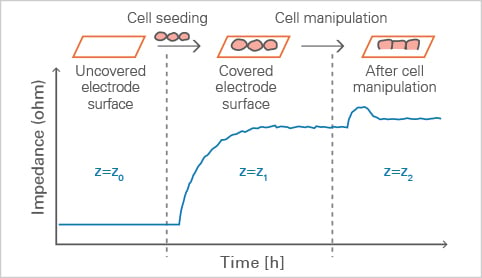
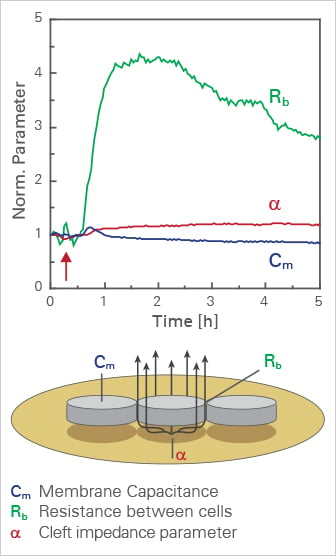
Measurement Specifications ECIS Zθ

Dimensions: 438 x 216 x 508 mm
Weight: 18 kg
- Complex impedance Z, R and C
- Constant current
- Well capacity: 16 (2 x 8) or 96 wells
- Ability to model multi-frequency data (barrier function)
- Maximum data acquisition rate (single frequency): 5 points / sec
- Multi-frequency measurements: 11 frequencies ranging from 62 Hz to 62 kHz (5–7 seconds per well acquisition rate in MFT mode)
- Power KW = 60 watts
- Operating voltage = 120/240 V AC
- Operating current = 0.6 A
- Heat output during operation = 1 watt
- Energy consumption of all equipment = 60 watts per hour
General Specifications
16 Well Array Station
- Dimensions: 127 x 152 x 44 mm
- Weight: 0.45 kg
96 Well Array Station
- Dimensions: 178 x 254 x 63.5 mm
- Weight: 0.68 kg
Flow Option
- Ability to measure under dynamic flow conditions (ECIS Flow Module)
Wound / Electroporate Option
- User-defined setting of time, ampere, and frequency
- Automated wounding during data collection
- Delayed wounding can be set
Operating Systems
Windows XP through Windows 10 (Mac OSX analysis only)
ECIS Cultureware
The ECIS Cultureware consists of disposable electrode arrays containing gold film electrodes. Click here to learn more about the various types of ECIS Cultureware.
For further information please contact us.
For more than 800 scientific publications using the ECIS technology please visit www.biophysics.com.
Impedance Measurements Under Flow Conditions
For impedance measurements under flow conditions, combine the ECIS System with the Pump System to more closely simulate the in vivo environment.


